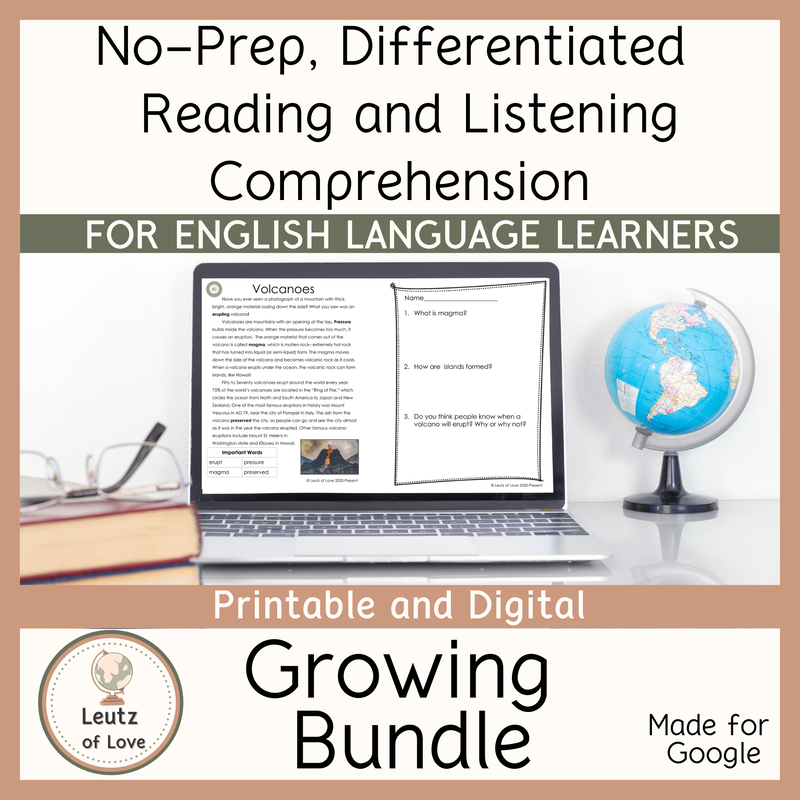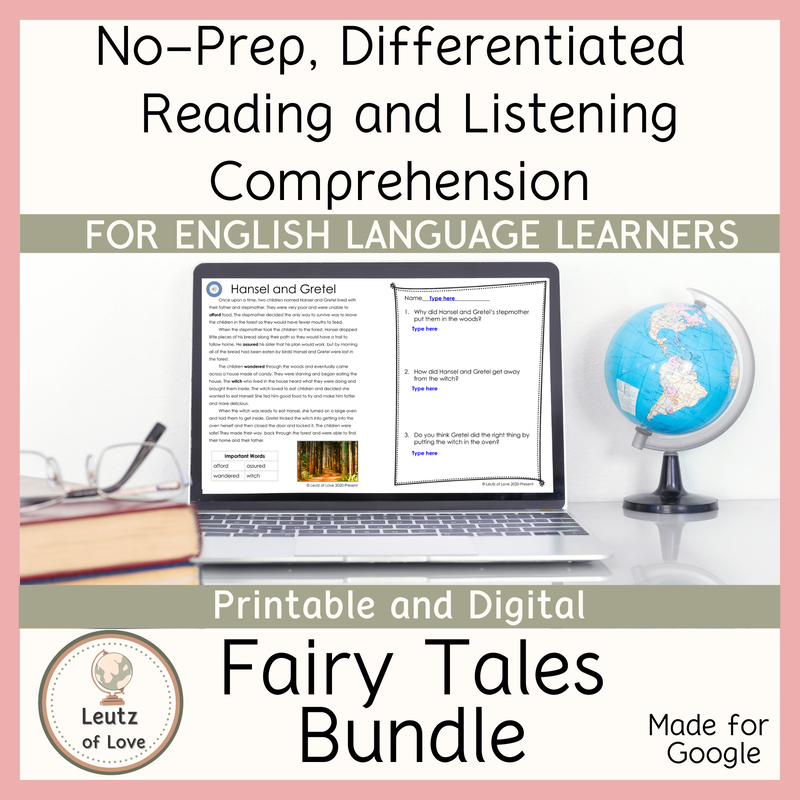Hosting fun and engaging Literacy Nights your English Language Learners will love doesn't have to be overwhelming!Are you considering planning a Literacy Night for your families, but feel overwhelmed and not sure where to start? This post is for you! Planning a Family Night (especially for English Language Learners) can feel daunting, but it doesn’t have to be as difficult as you think! Before we dive in, if you’re looking for the ultimate guide to creating the ESL classroom of your dreams, look no further! You’ll learn to transform your classroom, from creating lessons that build confidence to engaging the whole family! Click here for the free guide. I work as the Family Literacy Coordinator for a non-profit that provides adult education for refugees and immigrants in our community. Part of my job? Putting on monthly Family Literacy Nights at our center as well as at two local elementary schools. That means I host 3 Literacy Nights every month of the school year! While now, the Literacy Nights feel like #nobigdeal and are just another part of my schedule, it hasn’t always been that way. I planned our first Literacy Night for over a month. And then… No. One. Came. Literally not one person. I’ve made all sorts of mistakes along the way (like not wanting to annoy people with advertising!) but now, our Family Nights are routinely packed full of people and fun! I know that planning your first Family Literacy Night (or your third! Or tenth!) can feel like a big undertaking, but it doesn’t have to be that way at all! Read on for the tips I’ve learned along the way, and avoid all the mistakes I made at the start! 1. Pick a Theme for Easy Literacy Night PlanningYou may not be someone who generally plans on a theme, but let me tell you, picking themes for our Family Literacy Nights has made planning SO much easier! Choosing a theme helps narrow down the options for activities, and it makes it fun and immersive for families! Read Around the Rainbow theme? Paint or weave rainbows and have students draw a favorite book rainbow! (i.e. favorite book with a red cover, favorite book with an orange color, and so on!) Movie night theme? Read a short story and then watch the movie version (Room on the Broom is a fun one!) then pop some popcorn, let families get comfy, and give time to snack and read together! The possibilities are endless. 2. Utilize StationsIf your Literacy Night is anything like mine, families will come and go throughout the night, which is totally fine! Families are busy, and it’s most important that they are able to join in the activities. Having people flow in and out also helps with crowd control! However, it can be a little tricky to plan when you know everyone won’t be together at once. The solution? Stations! Set up stations around your room (or around your school!) and let families move from one station to the next. For extra fun, make a simple sticker sheet and let families get a sticker from each station they visit! You might want to let families turn in their completed sticker sheet for a small prize (I love using donated books or printable readers!) 3. Think About the Life Skills Your Families NeedFamily Literacy Nights are a great time to help ESL families build up essential life skills. Think about the life skills that you have noticed families might need extra help with. (Are families skipping doctor visits? Do grocery stores seem to overwhelm your families?) Then, plan a fun activity that practices that skill. The best part? It doesn’t have to be complicated or elaborate to be effective! We targeted reading street signs as one skill our families needed to practice. I incorporated it into our October Family Night by talking about street safety and the importance of paying attention to street signs if families are going trick-or-treating. Then, for one of our stations, we set out a cornhole game and would hold up a street sign and have the families tell us what the sign means. If they guessed correctly, they got to throw a bag! )Candy prizes for getting the bag in the hole are completely optional) Kids (and guardians) love it! 4. Find Simple Activities That Don't Require a Lot of ExplanationI think this might be the most important part of planning a successful Literacy Night! The simpler the activity, the better. While volunteers are great (and hopefully you have enough volunteers to man each station!), sometimes there will be stations or activities that families just have to do on their own. Plus, if your families speak multiple languages, interpretation of directions might not be possible. Simple, straightforward activities that require little-to-no directions are best and will help your ESL families feel comfortable at your event! 5. Remember That Free Time Together is Important, Too!When you’re planning your Literacy Night, don’t forget to leave time to just play. No matter the age of your students, your families will love having some downtime! Playing together is so important for families, but with the go-go-go lifestyle our families (and we!) are living, downtime to just play is hard to come by. Lay out some crayons and paper, some simple games, or make a station playing on the playground or in the courtyard! Your families will love making memories together, and kids will definitely appreciate the time away from structured activities. 6. Think About Community Partners You Can Invite Literacy Nights are a great time to engage with community partners and help your families learn about the opportunities all around them. Think about what community partners in your area might be interested in participating in your Family Literacy Night. Does the library have a summer reading program to promote, or can they bring a table with library card applications? Can your local parks department come and share about walking trails in your community? Is the grocery store willing to bring some ads and help families learn how to use coupons? Something to note as you’re looking for community partners — many museums and other community-based programs have outreach to low-income or refugee communities written into their grants. We have three great programs we work with that give our families free tickets and do free programming for our students because outreach to refugee communities is one of their goals! Try reaching out–you might just be able to help each other! 7. Advertise, Advertise, Advertise!One of the hardest parts of starting Literacy Nights is getting families to attend! That said, your main job once the planning is done is to advertise, advertise, advertise! Send flyers home, make phone calls, send text messages, and post about the event on your school’s app and social media. It might feel like overkill, but we all know families don’t see everything that we share! It is especially important to make personal calls to our ESL families as school events might not be familiar, and/or they might not feel comfortable attending. Encourage them to bring their family, and share what they can expect. After all, you planned out simple, activities that don’t require a lot of explanation in step 4. Let them know that they won’t have any trouble figuring out what’s going on throughout the night! 8. Track Attendance and Progress If you’re planning on making Family Literacy Nights a recurring event, it’s important to track attendance! Seeing if families are returning, new families are joining, or if there’s a pattern to who’s showing up (i.e. everyone who comes is in the same class! A simple paper sign-in sheet works great, but Google Forms are even better! The forms are quick, and the data is saved and easy to organize. I like to add in a few extra questions so I can track progress with our families (which is helpful if you ever need to back up why you’re hosting Literacy Nights!) Here’s the questions I include: -Guardian Name -Children’s Grades -Contact Info (So I can tell them about our next event!) -How often do you read to your child? -How often do you talk to your child’s teacher? -How many children’s books do you have at home? -Do you know how to help your child learn? Then, I just export our data to a Google Sheet with the click of a button and alphabetize the form! The date and time they completed the form is automatically included, and I can see the progress families are making (and how many times they came to our events) at a glance! 9. Have Fun!Sure, planning a Literacy Night is a lot of work, but by the time the event actually starts, most of the work is behind you! Take time throughout the night to talk to families and play together! You might get some great ideas for your next event, and better yet, you’ll probably have FUN! You’ve earned it!
Interested in more ways to engage the entire family in your ESL classroom? Click here for a free workbook that will guide you to create the English Language Learner community of your dreams! Family Literacy Nights are SO much fun and are a great opportunity for your families to learn and play together, and they can be a reality at your school, too! With the tips above, you’ll be able to host a stress-free Literacy Night that your families (and administrators!) will LOVE!
0 Comments
Your comment will be posted after it is approved.
Leave a Reply. |
Categories
All
AuthorHey there! I'm so glad you're here! Categories
All
Leutz of Love Blog |








